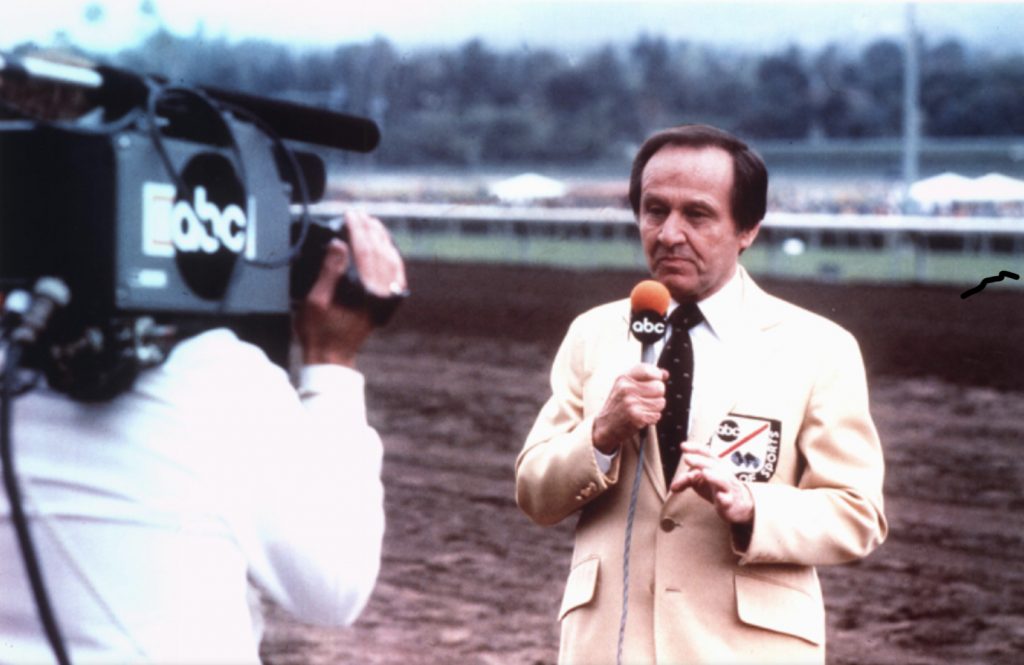
Jim McKay Was A Hometown Hero
By Kate Richards
There was a time in America when shocking, unforeseen events riveted us to one source of news, and this was one of them. It happened in Munich, Germany in 1972 when national teams had marched into a great gathering of athletes and just days later, the joy of international camaraderie was shattered and replaced by wrenching anguish. Where there had been music, fireworks and tests of agility, there was only horror.
It was personal for a newscaster from Maryland. Covering the weeks’ long events for ABC, Jim Mckay had taken a break and gone for a swim in his hotel pool. It was not until 17 hours later, surrendering himself to a change of clothing that McKay realized that he had still had on his swim trunks. In homes across America and throughout the world, Jim McKay, had become a single eloquent source for the horror of a terrorist kidnapping of the Israeli wrestling team. From the first police reports radioed into the ABC broadcast command center to his poolside alert, Jim McKay, in his yellow ABC Olympic jacket, became the centrifuge for both information and grace. Sorting through the ‘official’ German police reports, the International Olympic Committee statements, Producer Roone Arledge’s clandestine Police radio monitor, jotting notes on his ever-present yellow legal pad and watching multiple camera monitors, Jim McKay became the measured eye of a terrible storm. So finally, as if in some horrible Greek deus ex machina, he looked directly into his camera’s red-light and voiced the dreaded denouement for the tragedy after so hopefully describing the German rescue operation.
“They are all gone”.
McKay later described his thoughts and hesitation of this final report as he knew that his news was privileged and fresh. He later reflected that he was troubled by the immediacy of his on-air responsibility. His thoughts were of the parents of the Israeli wrestling team hostages as they had no idea of the airport gun battle. He chose his words carefully.
Jim McKay was good with words and always carried a legal pad with him to note a turn of phrase. He was as gifted in choosing the right verbal pictures as he was in delivering them in a smooth, calming fashion. McKay was unusual in that respect as most of his peers were fed facts and bright lines through their earpiece by a director or a producer.
Born in Baltimore in 1921as James Kenneth McManus, McKay’s writing career began as a police reporter for the Baltimore Sun, while forming a life-long friendship with the newspaper’s resident turf writer, Joe Kelly. Later, when WMAR-TV in Baltimore sought to test a sports theme, it was Jim, together with his friend Joe Kelly and Pimlico’s publicity agent, Dave Woods, who bravely went on air and described two races minus cues, a format or a script. As Joe Kelly later described his anxiety where he sought his friend’s advice, he related that McKay told him to visualize two people in their living room waiting for a story to unfold.
The station’s first trial sports broadcast was taped at Pimlico Racetrack because this was Jim’s favorite sport. Horse racing for this future host of the iconic “Wide World of Sports” was his passion and remained so throughout his career and until his 2008 death on his horse farm, Bellefield Farm, in Monkton, Maryland. Jim McKay was a racing enthusiast, a credit to Maryland’s industry and in 1984 became the creator of the Maryland Millions racing series in 1984 a breeder’s reward and recognition series modeled on the Breeders’ Cup. The next Maryland Millions Race day is scheduled for October 19, 2019 at Laurel Park.
Several scriptwriters and producers have claimed the iconic lines that introduced the televised sports cavalcade but the
“thrill of victory and the agony of defeat”
was pure McKay. He was the first sports broadcaster to receive an Emmy, an honor historically reserved for professional performers.
One can reflect on the current climate going into this second event of the Triple Crown, while looking back on the evolution of racing television as well the pageant of sports as entertainment TV.
Jim McKay called his marathon reporting of the 1972 Munich Olympic tragedy as a sort of death of innocence. Herman Hesse wrote;
“Because the world is so full of death and horror, I try again and again to console my heart and pick the flowers that grow in the midst of hell.”
The Preakness is a celebration to console the racing heart exhausted from Derby contention and be thankful that there were no deaths to recall.
Always check with Past the Wire for the latest horse racing new



